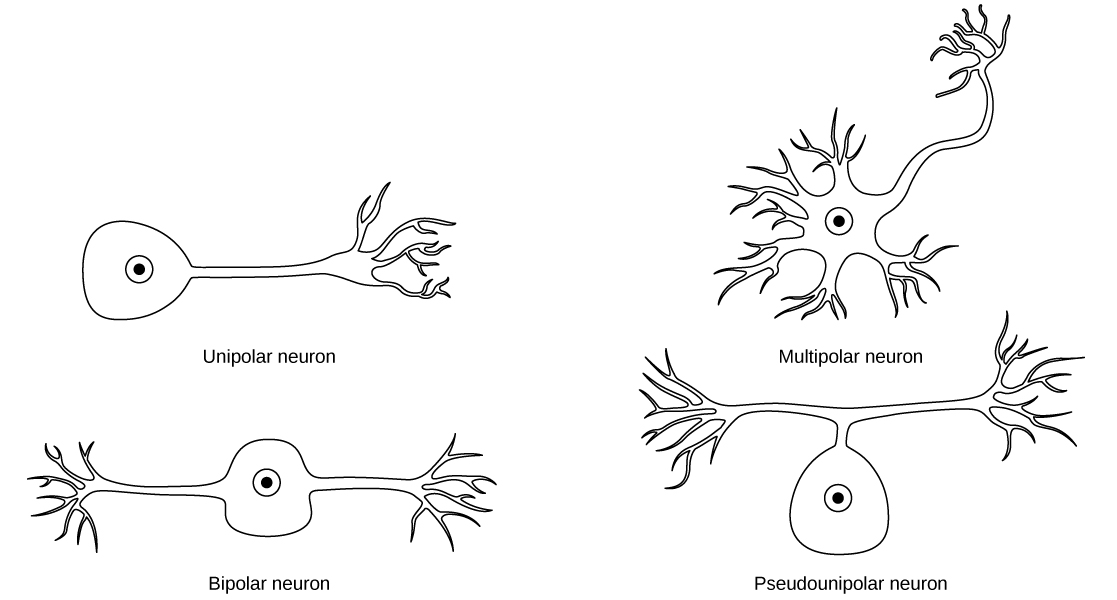
Pseudo- unipolar neurons are
A) Without any dendron
B) Without any axon
C) Actually bipolar
D) Actually non-polar with an edge of cyton prolonged
Answer
567.6k+ views
Hint: A type of neuron which has one extension from its cell body is known as pseudounipolar neuron. This type of neuron contains an axon which is split into two branches; one branch travels to the PNs or the peripheral nervous system and the other to the CNS or the central nervous system.
Complete answer:
A pseudo-unipolar neuron is a sensory neuron in the PNS. This neuron contains a short axon that connects to the spinal cord and a long dendrite. A pseudo-unipolar neuron has one dendrite and one axon by definition. The axon and dendrite are sometimes called proximal process and distal process respectively. The dendrite conducts nerve impulses towards the cell body, and axon conducts them away from the cell body. A single process arises from the cell body and then divides into an axon and a dendrite. Pseudo-unipolar neurons develop embryologically as bipolar in shape, and thus termed as pseudo-unipolar instead of unipolar.

Hence, the correct answer is option (C).
Additional information:
The dendrite of a pseudo-unipolar neuron is functionally and structurally an axon, except at its terminal part, where it contacts a specialized sensory organ. It initiates an action potential that is propagated toward the cell body, when the sensory organ transduces information. Since the dendrite functions as an axon, this action potential does not degrade, but it reaches the axon unabated and continues towards the central nervous system.
Note: The majority of neurons in cranial nerve sensory ganglia and the neurons found in the dorsal root ganglia carry information about vibration, proprioception, touch, temperature and pain. The neurons in the mesencephalic nucleus carry muscles of mastication information.
Complete answer:
A pseudo-unipolar neuron is a sensory neuron in the PNS. This neuron contains a short axon that connects to the spinal cord and a long dendrite. A pseudo-unipolar neuron has one dendrite and one axon by definition. The axon and dendrite are sometimes called proximal process and distal process respectively. The dendrite conducts nerve impulses towards the cell body, and axon conducts them away from the cell body. A single process arises from the cell body and then divides into an axon and a dendrite. Pseudo-unipolar neurons develop embryologically as bipolar in shape, and thus termed as pseudo-unipolar instead of unipolar.

Hence, the correct answer is option (C).
Additional information:
The dendrite of a pseudo-unipolar neuron is functionally and structurally an axon, except at its terminal part, where it contacts a specialized sensory organ. It initiates an action potential that is propagated toward the cell body, when the sensory organ transduces information. Since the dendrite functions as an axon, this action potential does not degrade, but it reaches the axon unabated and continues towards the central nervous system.
Note: The majority of neurons in cranial nerve sensory ganglia and the neurons found in the dorsal root ganglia carry information about vibration, proprioception, touch, temperature and pain. The neurons in the mesencephalic nucleus carry muscles of mastication information.
Recently Updated Pages
Master Class 11 Computer Science: Engaging Questions & Answers for Success

Master Class 11 Business Studies: Engaging Questions & Answers for Success

Master Class 11 Economics: Engaging Questions & Answers for Success

Master Class 11 English: Engaging Questions & Answers for Success

Master Class 11 Maths: Engaging Questions & Answers for Success

Master Class 11 Biology: Engaging Questions & Answers for Success

Trending doubts
There are 720 permutations of the digits 1 2 3 4 5 class 11 maths CBSE

Discuss the various forms of bacteria class 11 biology CBSE

Explain zero factorial class 11 maths CBSE

What organs are located on the left side of your body class 11 biology CBSE

Draw a diagram of nephron and explain its structur class 11 biology CBSE

How do I convert ms to kmh Give an example class 11 physics CBSE




